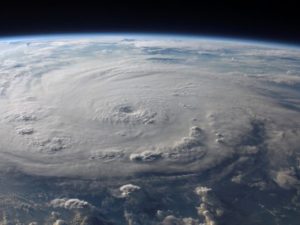Greece, the Global Economy, and Big History
Watching the sunset from the cliffs of the Santorini caldera attracts tourists from all over the world, I recently discovered on a family sailing trip in the Greek Islands. The Cyclades archipelago is one of the cradles of human civilization, dating back 6,000 years, when late Neolithic and early Bronze Age communities thrived here. They cultivated emmer wheat and wild barley, sheep and goats, and were surrounded by abundant fish food. Shipbuilding and seafaring flourished. As Minoan civilization in nearby Crete developed, the Cycladic communities faded in significance. The explosion of the Santorini volcano 3,600 years ago is thought to have then caused the fall of the Minoan civilization. The remains of this enormous eruption are a stunningly beautiful island formation in deep azure waters.
The volcano blowing up today is the Greek financial system, and its reverberations are being felt around the world. The debt crisis has unleashed a vicious self-reinforcing downward spiral that threatens a major shock to the global economic system. Last year, the gross national product of Greece, a country of some 10 million people, was estimated at $312 billion ($27,600 per capita). The growth rate is negative—minus 2.3 percent in 2009, minus 3.5 percent in 2010, minus 6 percent in 2011. Greece’s exports totaled $27 billion last year, while its imports were $66 billion. External debt totaled $583 billion. Without economic growth, the burden of refinancing and repaying this debt grows. And with a fertility rate of 1.39 children born per woman today, Greece’s population is likely to get older and decline to 7 million or less by 2100.
Tourism can only go so far in filling this gap. While tourism provides 15 percent of the GDP, it employs 65 percent of the labor force. Unemployment is running at 17 percent. Twenty percent of the population is below the poverty line. The bloated public sector accounts for about 40 percent of the GDP, but Greeks don’t have much faith in their government. Tax evasion is rampant. Capital flight is accelerating as Greeks move their liquid assets offshore in anticipation of the coming eruption. These are the fundamentals to which we can then add the psychology of global markets, which tends to pile on opportunities and flee risks en masse.
The austerity measures and reforms have reduced, but not eliminated, the government deficit. Pushing through these unpopular reforms has led to widespread unrest in Athens and political instability in the government. The massive austerity cuts exacerbate the economic recession and further reduce needed tax revenues and economic growth. Many investors now assume the worst-case scenario, which means default and Greece leaving the Euro. It is a financial supervolcano that will reverberate around the world, the anticipation of which has already unleashed negative feedback declines in Spain, Italy, Portugal, and France. The current problems in Greece may soon enough be our problems as well.
Being contrarian tourists and avid sailors, we decided this was a perfect time to visit the Greek Islands. But as we sailed the 46-foot yacht from island to island, my thoughts were less about these financial woes and more of a meditation on the environmental collapse that began in this region with the Bronze and Iron ages.
The deforestation of the Mediterranean began with the rise of metallurgy and ceramics, shipbuilding and construction. When the trees were cut down, the soil eroded to the bottom of the sea, and the ground water dissipated. It took a few thousand years, but by the decline of the Roman Empire, the process was mostly completed throughout the Mediterranean. What, I wondered, did these rocky islands look like when they were covered with tall trees, rich soils, and flowing streams?
In the last hundred years, an environmental catastrophe also occurred with the over-fishing of Mediterranean waters. At every harbor town we visited, fishermen spent long hours sitting around with little to do but mend their empty nets and be photographed by tourists. In the many tavernas on shore, it was hard to find fresh fish on the menu. There were few fish to be seen snorkeling the rocky coastlines of the islands. About 40 years ago, when I first visited the Mediterranean and swam in its blue waters, this was not the case.
In the near short term, the prospects for Greece are not happy, but it is possible to envision a different future. What Greece has in abundance is sun and wind, salt water and uninhabited land. Greece could be a renewable energy farm for Europe, exporting electricity to the northern latitudes. Abundant energy is also the key to desalinization plants needed in this arid environment. Ocean preserves can be established to revitalize fish stocks, and a thousand-year plan to reforest the region envisioned and implemented. As in the past, Greeks will migrate around the world in search of opportunities, even as northern Europeans and others find in Greece a destination for rest and renewal. Ancient Greek culture will forever be imprinted on our civilization.
With the compounded dangers of economic contraction, environmental degradation, and demographic transitions, Greece can be seen as a microcosm of the challenges of the 21st century. There is reason to be worried.
Still, this was our family vacation. Looking at the star-filled sky at night from a secluded anchorage, I was reminded of a line from Nikos Kazantzakis’ 1946 book Zorba the Greek:
Boss, only one thing is wrong with you—you think too much. Just come on! This is not the time for thinking; the moon is full, and the whole ocean is dancing. Don’t miss the challenge…
The long history of our evolving civilizations, like the sunsets and sunrises from the cliffs of Santorini, provide an opportunity to reflect on the dramatic changes of the last century and the big problems of our modern world from the vantage point of deep time. “All that is required to feel happiness here and now,” Zorba reminds us, “is a simple, frugal heart.”





